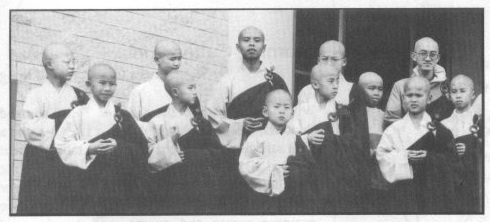上人曾說「出家是最徹底的布施」,因為修道人將自己的身心性命奉獻給一切眾生,只有予,沒有取。故出家非但不是遠離眾生,而是開展個人私情之小家,擴為法界無私之家。亦轉近孝、小孝、有限的孝,化為遠孝、大孝、無盡的孝。是則出家即救世的根本。
人能弘道,法賴僧傳,僧人必須是濁世大苦海中一股清淨的正法流,乃足以作大明燈,為大舟航,故上人特重僧伽教育。兒童是國家之本,沙彌是僧團之根,樹根健全了,自然枝葉華果繁茂。是以上人教育幼齡沙彌可謂耗盡心血,冀其皆成法門龍象。
簡言之,「沙彌」是僧中幼童,「沙門」(即「比丘」)是僧中成人。「沙彌」是梵語,意即「息慈」,息一切惡,行一切慈。受過具足大戒後,則稱「沙門」,中譯「勤息」,勤修戒定慧,息滅貪瞋癡。上人意欲此批幼齡沙彌早日長成,發大人之智,養大人之德,創大人之事。
上人識見宏偉,對沙彌的培訓方針,以法界佛教總會的三大宗旨、六大條款為依歸。養成不攀緣、不化緣、不求緣、不爭、不貪、不求、不自私、不自利、不打妄語之堅貞操守,高尚僧格。沙彌既已隨佛出家,披搭如來法衣,當奉大乘教法之修持為本分事,穩固道業基礎;又輔以一般學齡的常識教育,作為將來弘法之利器。融通世出世法,在塵而不染塵,行菩薩救世大業,返本還原,同歸正覺。
「登高必自卑,行遠必自邇」,上人排定沙彌日課──誦經、學戒、打坐、禮懺、說法、背經、修練四十二手眼...等,一步步奠定沙彌日後弘通禪、教、律、密、淨五大宗派的堅固基石。
經上人解行並重的引導,眾沙彌於短短半年培訓下,各方面皆在平實中增長。此實正法之曙光漸露,佛道大昌,將不久於未來!
 |
|
The Venerable Master has said, "Leaving the home-life is the most thorough form of giving." This is because a cultivator of the Way gives his own body and mind to all living beings. There is only giving and no taking. Therefore, leaving the home-life does not mean leaving living beings; rather, it means expanding the small home of personal love to a large and selfless home of the Dharma Realm. To transform narrow, small, and limited filiality to far-reaching, great, and limitless filiality is the principle of leaving the home-life to save the world.
It is people who can propagate the Way; and it is the Sangha that must transmit the Dharma. The members of the Sangha must represent the pure and clean current of proper Dharma in the great bitter sea of this turbid world; only then will they be able to serve as a great bright lamp and a great ship of salvation. Thus the Venerable Master takes Sangha education especially seriously. Children are the basis of a nation; Shramaneras (novice monks and nuns) are the roots of the Sangha (Buddhist monastic order). If the roots of a tree are strong and healthy, the branches, leaves, and fruits will naturally flourish. Therefore, the Master has devoted painstaking effort to educating the young novices with the hope that they will all become Dharma vessels in the future.
To put it simply, a "Shramanera" is a child within the Sangha, and a "Shramana" (that is, a Bhikshu) is a full-grown member of the Sangha. Shramanera is a Sanskrit word meaning "extinguishing and kindness"—that is, to extinguish all evils and practice all deeds of kindness. After a Shramanera receives the full precepts, he is then called a Shramana. Shramana means "diligent and extinguishing"—to diligently cultivate precepts, samadhi, and wisdom and to extinguish greed, anger, and stupidity. The Master wants these young Shramaneras to soon grow up, develop the wisdom of heroes, nurture the virtue of heroes, and perform heroic deeds.
With his magnanimous vision, the Venerable Master bases the young novices' training on the Three Great Principles and the Six Great Guidelines of Dharma Realm Buddhist Association. He hopes that they will develop into lofty, noble Sangha members possessed of a firm, pure integrity that refrains from exploiting conditions, begging for favors, seeking affinities, contending, being greedy, seeking, being selfish, pursuing personal advantages, and lying. Since these Shramaneras have already left the home-life to follow the Buddha and have donned the Dharma robes of the Tathagata, they should take cultivation in accordance with the teaching of the Great Vehicle as their basic responsibility, so that they can build a firm and strong foundation in the Way. The Master also supplements their training with the general education that other children their age would receive. It is hoped that they will become good vessels for propagating the Dharma, perfectly understand worldly and transcendental dharmas, remain undefiled while dwelling in defilement, practice the Bodhisattva's great work of saving the world, return to the source, and attain proper enlightenment.
"To ascend to high places, one must start from low. To travel to distant places, one must begin from close by." The daily schedule the Master has set for the Shramaneras—reciting Sutras, studying the precepts, meditation, bowing in repentance, speaking Dharma, memorizing Sutras, practicing the Forty-two Hands and Eyes, and so on, is, step-by-step, building a strong foundation for future propagation of the five main schools of Buddhism: Chan, Teaching, Vinaya, Secret, and Pure Land.
Under the Venerable Master's guidance, which emphasizes both understanding and practice, these Shramaneras have shown steady growth in all respects in the past half year. This represents the dawn of proper Dharma; Buddhism will surely be flourishing in the near future!
|